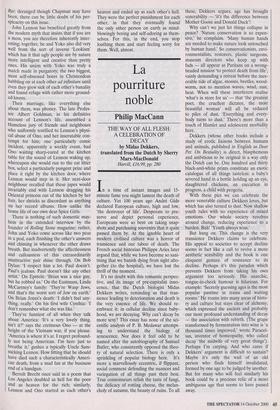La pourriture noble
Philip MacCann
THE WAY OF ALL FLESH: A CELEBRATION OF DECAY by Midas Dekkers, translated from the Dutch by Sherry Marx-MacDonald Harvill, £16.99, pp. 280 In a time of instant images and 15- minute fame you might lament the death of culture. Yet 100 years ago Andre Gide declared European culture, high and low, `the destroyer of life'. Desperate to pre- serve and depict personal experience, Europeans were so bent on taking snap- shots and purchasing souvenirs that it quite passed them by. At the ignoble heart of modern civilised culture was a horror of transience and our taboo of death. The French social historian Philippe Aries later argued that, while we have become so sani- tising that we banish dying from sight alto- gether (to the hospital), we have lost the thrill of the moment.
It's no doubt with this romantic perspec- tive, and its image of pre-capitalist inno- cence, that the Dutch biologist Midas Dekkers writes, reminding us that tran- sience leading to deterioration and death is the very essence of life. We should re- embrace it: in cellular decline since baby- hood, we are decaying. Why can't decay be more sexy? This essay has none of the sci- entific analysis of P. B. Medawar attempt- ing to understand the biology of senescence. Nor does it feel odd to be named after the autobiography of Samuel Butler, who consistently opposed the theo- ry of natural selection. There is only a sprinkling of popular biology here. It's more a marvellously eccentric, if flippant, social comment defending the nuances and variegation of all things past their best. True connoisseurs relish the taste of fungi, the delicacy of rotting cheese, the melan- choly of autumn, the beauty of ruins. To all these, Dekkers argues, age has brought venerability — 'it's the difference between Mother Goose and Donald Duck'!
Why can't we just let things collapse in peace? 'Nature conservation is so expen- sive,' he complains. 'Many human hands are needed to make nature look untouched by human hand.' So conservationists, envi- ronmentalists, restorers, plastic surgeons, museum directors who keep up with fads — all appear as Puritans on a wrong- headed mission `to protect death from life', vainly demanding a retreat before the inex- orable tide of algae, mosses, beetles, wood- worm, not to mention waves, wind, rust, heat. When will these interferers realise `what's in store for us' — that 'the greatest poet, the cruellest dictator, the most beautiful woman' will all be reduced to piles of dust. 'Everything and every- body turns to dust.' There's more than a touch of Hamlet and adolescent morbidity here.
Dekkers (whose other books include a study of erotic liaisons between humans and animals, published in English as Dear Pet: On Bestiality) is direct, blasphemous and ambitious to be original in a way only the Dutch can be. One hundred and thirty black-and-white prints constitute an exotic catalogue of all things tasteless: a baby's severed hand in a bottle holding up an eye, slaughtered chickens, an execution in progress, a child with progeria.
With these pits we can celebrate the more venerable culture Dekkers loves, but which has also turned to dust. Now shallow youth rules with no experience of mixed emotions. Our whole society revolves around change, reducing experience to a burden. Bah! 'Youth always wins.'
But hang on. This change is the very transience Dekkers claims to celebrate. His appeal to societies to accept decline seems in fact like a call to revive a more aesthetic sensibility and the book is one eloquent gesture of resistance to its decline. Perhaps it's this paradox which prevents Dekkers from taking his own argument too seriously. His anarchic, tongue-in-cheek humour is hilarious. For example: 'Secretly guessing ages is the most popular pastime in trains and waiting rooms.' He roams into many areas of histo- ry and culture but stays clear of alchemy, which expressed the ancient and probably our most profound understanding of decay — the association with rebirth. (The grape transformed by fermentation into wine is 'a thousand times improved,' wrote Paracel- sus, inventor of homeopathy, who called decay 'the midwife of very great things'). Perhaps I'm carping. And who cares if Dekkers' argument is difficult to sustain? Maybe it's only the wail of an old person who finds himself invalidated, formed by one age to be judged by another. But for many who will feel similarly his book could be a precious relic of a more ambiguous age that seems to have passed away.


















































































 Previous page
Previous page